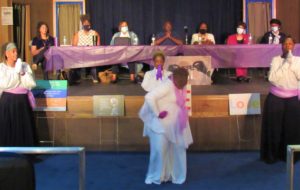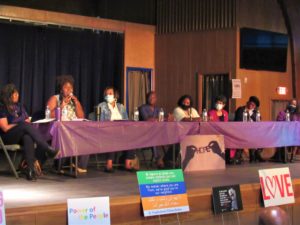Tendaji Talk: “The Deep Sting of Slavery”
By Harold C. Ford
“It’s really not enough to say, ‘Those were horrible days and let them pass.’ Uncovering this buried history … could also help ease the kind of intergenerational trauma that silence can mask, trauma that can seep through entire communities.”
–Margaret Burnham, Northeastern University professor, from “Healing Requires Truth” by Samantha Michaels, Nov-Dec 2021 issue of Mother Jones
‘Slavery has tentacles and they are deeply rooted in society today.”
–Kenyetta Dotson, Tendaji Talk moderator, Oct. 12, 2021
The most recent Tendaji Talk, “The Deep Sting of Slavery,” featured eight panelists at the New McCree Theater, 4801 Clio Road in Flint Oct. 12.
Panelists included:
- Ashnee Young: strategy consultant; military veteran; Legal Services of Eastern Michigan, fair housing education coordinator; strategy consultant
- Ladel Lewis: Jane Key Solutions CEO; self-described “community champion”
- Tarnesa Martin: Hurley Medical Center, nurse, patient resource and community service advocate; self-described “mother of two children, grandmother-to-be.”

“Unity” dancers perform at conclusion of Oct. 12 Tendaji Talk. (Photo by Harold Ford)
- Charles Winfrey: New McCree Theater, executive director; District 2 Genesee County Board of Commissioners, commissioner
- Ella Greene-Moton: Partners Community-Based Organizations Partners – Ethics Review Board, administrator; NAACP ACT-SO (Academics, Cultural, Technological, Scientific Olympics), chair; Center for Public Health and Community Genomics, community liaison; former Flint Board of Education member.

Tendaji Talk panelists (L-R): Ashnee Young; Ladel Lewis; Tarnesa Martin; Charles Winfrey; Ella Greene-Moton; Sharon Sadler; Toy Pridgeon; Alexis Murphy-Morris. (Photo by Harold Ford)
- Sharon Sadler: Bethlehem Temple Church, associate pastor; Freedom School, principal; State of Michigan, certified prevention specialist; Flint Odyssey House, representative
- Toy Pridgeon: Inside the Haven, founder and director; self-described “author, wife, mother, grandmother, community activist”
- Alexis Murphy-Morris: “health, wellness and fitness professional” (Linkedin profile); retiree from Genesee County Pre-School program; Quinn Chapel African Methodist Episcopal Church of Flint, board member
(Note: the biographical descriptions above are based on self-introductions at the Oct. 12 event and various internet sites. The panelists’ comments below are edited and arranged for clarity and brevity.)
The moderator for the talk was Kenyetta Dotson, a military veteran, social worker, and winner of several awards including Zeta Phi Beta Woman of the Year (2014) and the Sybil Award (2011).
Not-so-distant past
At least two of the panelists at the Oct. 12 Tendaji Talk –Greene-Moton and Lewis — shared vivid memories of slavery’s “deep sting.”
Greene-Moton recounted her early years in the 1950s on a plantation in the Mississippi Delta where she was born.
“There were many plantations,” said Greene-Moton. “Some of the plantation owners were cruel. By the grace of God, we ended up on a plantation where folk had a sense of fairness.”
“I can remember as a little girl,” recalled Greene-Moton, “my first job was going to the cottonfield, working in that cottonfield, chopping cotton.”
Greene-Moton was paid $2.50 for a day that might begin at 6 a.m. and end 12 hours later at 6 p.m. She said the elders in the family were paid less.
“We didn’t have indoor toilets,” she recollected. “I had to walk up to the ‘big house’ to get water.”
Greene-Moton lived on that plantation with the “big house” until her third grade school year.
Sharecropping
“There’s different levels of slavery,” Lewis said. She explained that sharecropping replaced chattel slavery as an institution of repression. Her grandmother’s grandmother was born a slave. A few generations later, her parents were sharecroppers in Tylertown, MS.
“The laws were not set up in our favor back then,” Lewis recalled. “They [Lewis’s parents] had to escape in the middle of the night.” Lewis said that if they were caught leaving the plantation it might cost them their lives.
“They had to leave everything that they knew, everything that they owned,” she said. “They didn’t have a quality of life (and) wanted better.” Her family moved to Michigan in the 1960s.
Devastating
“It (slavery) has a devastating effect,” Winfrey declared. “It beat us down. It belittled us. It humiliated us. It instilled a lot of the values that divide us today. We still backbite, we’re envious, we’re jealous.”
“So here we are now, still feeling the lingering effects of slavery, the psychological effects of slavery, of post-traumatic slave syndrome,” Winfrey continued. “It’s almost like we’re boxed in and can’t really free ourselves from that bondage.”
Young agreed: “Everything that happened to our ancestors has had a residual impact on how it is that we exist in this day and age, from how we treat each other, to how we’ve been able to build wealth, to how we try to fit in … There are still things today that enslave us.”
Transition to Jim Crow
“Jim Crow legalized segregation,” Pridgeon asserted. Redlining and other discriminatory practices denied African Americans home ownership, a major source of wealth, she said.
Home ownership, she continued, can provide opportunities for building wealth in other ways by taking out loans and using them for business investments and college tuition.
“This country was founded on slavery,” Pridgeon said. “We were the wealth. Old money was generated upon our backs (but) the wealth didn’t pass down to us … Those that are descendants of slave masters (are) still benefitting from the effects of it (slavery and Jim Crow).”
Sadler experienced Jim Crow-style segregation up close and personal when, after graduation from Flint Central High School, she moved to Alabama with her husband where they resided near Birmingham from the mid-1970s to the late-1980s.
They inadvertently walked into a segregated restaurant whereupon the cook came out of the kitchen and excitedly pointed to the “Whites Only” sign and advised them to leave. The cook escorted them out of the restaurant and pointed to a window through which African Americans placed and received their orders for food.
Sadler also recalled the inability to purchase a home in a neighborhood where blacks were not permitted to live.
Sadler admitted, “It wasn’t until I was down South [I discovered] Jim Crow was alive and well.”
Frantz Fanon
Winfrey noted the work of black psychiatrist and author Frantz Fanon (1925-61), a French West Indian pan-Africanist who contrasted the independence struggles in Algeria and the U. S.:
“What he decided was that, because what the Algerians fought for and won their freedom, there was a distinct difference between African Americans who were given their freedom. The difference is that fighting for your freedom has a cataclysmic effect that purges you of all of those things that slavery instilled in you so that you become a free man.”
“When someone gives you your freedom,” Winfrey continued, “you carry all those things that slavery instilled in you into the generations.”
Health disparities
“When white America catches a cold, black America catches the flu,” moderator Dotson observed as she introduced the subject of health disparities.
“We are not preventive,” Martin declared. “A lot of times, African Americans, we don’t take care of ourselves.” Unhealthy eating, lack of exercise, and insufficient water contribute to health disparities, she said.
Martin also noted higher rates of diabetes, hypertension, COPD, and other ailments in the African American community may be due to a lack of health literacy and the expense of staying healthy.
As a health care professional, Martin observed “a lot of mistrust in the health care systems … When we go to the doctor, when we go to the hospital, our pain isn’t taken seriously.”
Sadler raised the spectre of epigenetics. “They are finding now the link between slavery and health care today,” she said. “Through extreme trauma and stress like the Middle Passage and Reconstruction and slavery, that it actually has the capacity to change the way genes read themselves and work.”
Pridgeon pointed an accusatory finger at food traditions that began during slavery as an unwelcome health inheritance. “The slop and the leftovers that was given to us to eat, and we passed it down generation to generation,” she said.
Generational divide
Several panelists pointed to a generational divide currently existing in the African American community as both a challenge and a potential stimulant for progress.
“There’s so much history, so much tradition, so much richness that oftentimes our (younger) generation misses out,” Young mused. “It hasn’t necessarily been presented to us in a way that is palatable.”
Lewis conjectured about a generational wealth divide within the black community. “The majority of our money is held in the pockets and the bank accounts of our Baby Boomers,” she said. “It’s not within our Millennial generation.”
Lewis identified the Baby Boomer generation (1946-1964) as the generation that acquired jobs, pensions, homes, automobiles and lifestyles during the civil rights era that were not possible before that and were less accessible in following generations.
“Our generation,” Lewis lamented, “the struggle has been lost.”
Sadler noted “adopt a senior” and “adopt a younger person” programs in her church to reduce the generational divide.
Young agreed that “dynamic learning opportunities” could be a way for tradition and history to be passed along from one generation to the next.
“I think that the way we position young people to learn is the way that we’re going to be able to progress,” Young concluded.
* * * * *
Monthly, Flint-based Tendaji Talks are sponsored by Neighborhoods Without Borders. Information might be found at the following websites: Neighborhoods Without Borders; Neighborhoods Without Borders Facebook page; Flint Neighborhoods United; or the Flint Public Library. The public is invited to join planning sessions for Tendaji Talks at 5:30 p.m. meetings, monthly, on second Tuesdays.
The Talks were created to honor the memory of Tendaji Ganges, a Flint social justice activist and educator at the University of Michigan-Flint, who died in 2014.
The topic of the next Tendaji Talk is “Education, Racism, and Health.”
EVM reporter Harold C. Ford can be reached at hcford1185@gmail.com.


You must be logged in to post a comment.